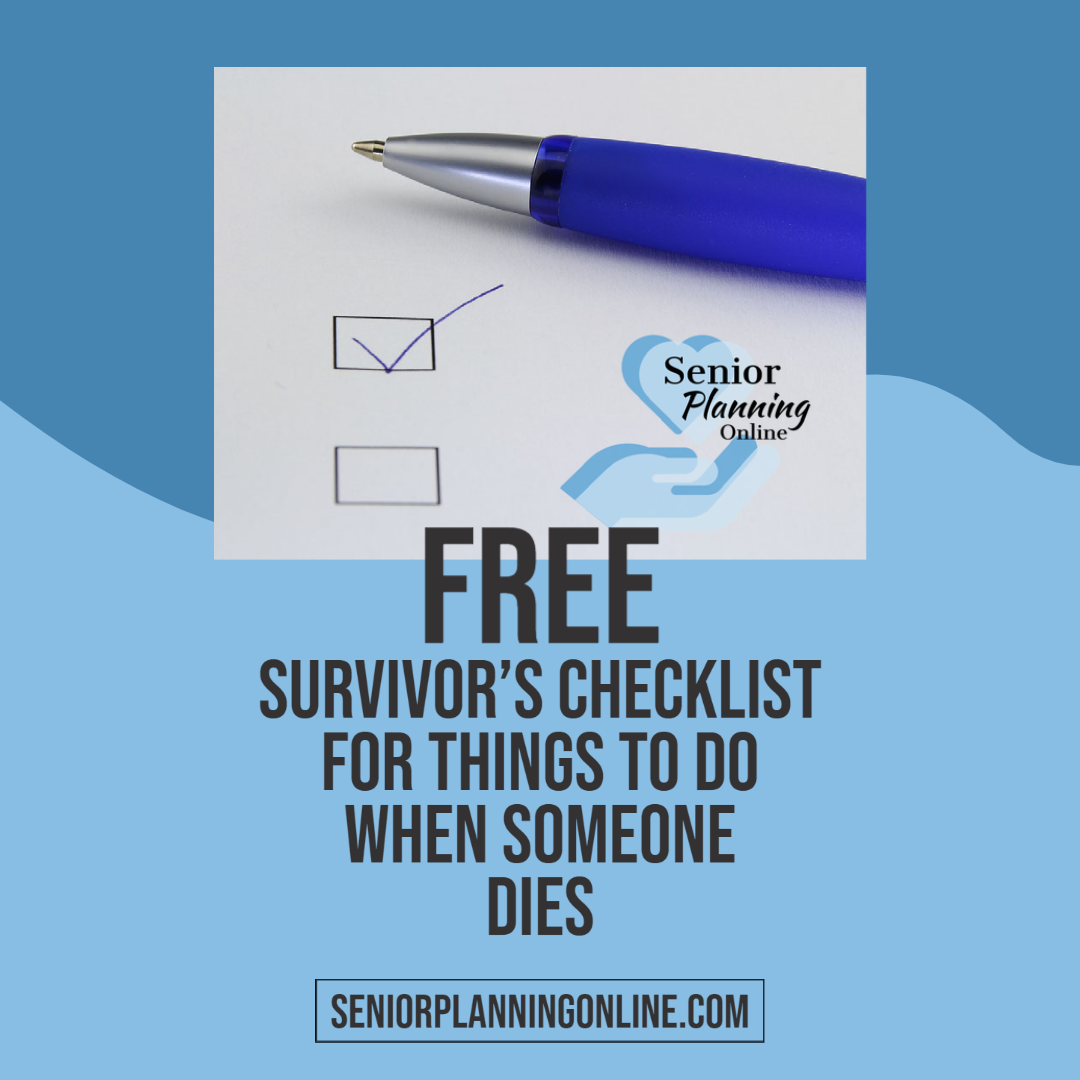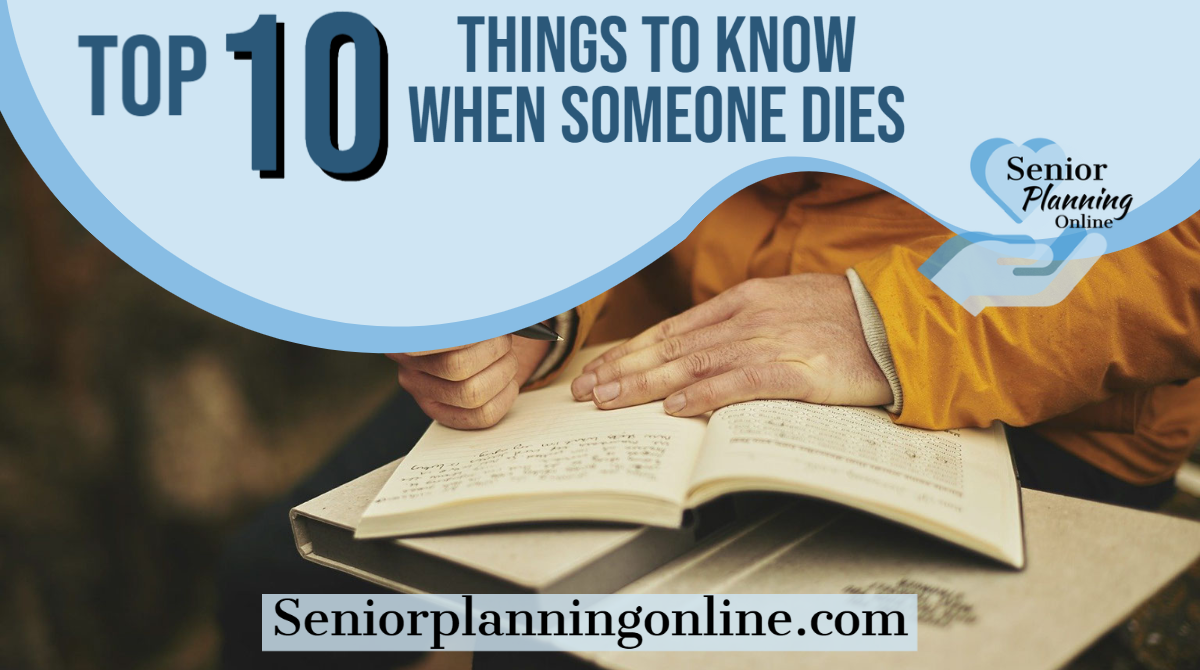Whether it is an expected death or an unexpected death, it is an emotional time for the family and loved ones of the deceased. Unfortunately, there is also a lot of planning and paperwork that must be done too. It can be overwhelming and confusing to know what to do when someone dies.
Pre-planning a funeral is so important and can help relieve some of the stress for family members. However, if you read our last post on “2021 Complete Guide to Pre-planning a Funeral“, you know that only 25% of Americans have actually pre-planned their funeral arrangements.
So if you are a family member or caregiver for someone who has died without a pre-planned funeral arrangement, this article may be helpful for you!
To make things easier, and simpler, you can have access to our FREE Survivors Checklist. It’s a one page, easy checklist of everything you will need to do when someone dies. Click Here to sign up to receive this FREE checklist in your email!
Top 10 things to know when your loved one has died
If your loved one is dying or has died in a hospital or in a nursing home setting, not only is it emotionally overwhelming, but often times you have no idea what to expect and what the next steps are.
Hospitals should have a Social Worker and sometimes a Chaplain available to help you with the next steps. If you don’t know who the social worker is, ask the nurse that has been caring for your loved one. The nurse will be able to track down the hospital Social Worker for you.
I’m a hospital Social Worker and I have worked with families on a regular basis who have experienced the unexpected or sometimes expected loss of their loved one. Through their grief they somehow have to carry out the next steps and often have no idea what they are.
This is what I tell family members on how to direct them through this devastating process:
First I want to preface this by saying, It is ok to be angry, devastated, depressed, confused, and overwhelmed. These are all normal feelings to be experiencing. Some family members put on a brave face to help keep things together for the rest of their family. That is ok too. If you are this family member, make sure you allow yourself to grieve too when you are ready.
1. Contacting the Necessary People
If the deceased had made a letter of instruction, there should be a list of contacts you should make. If one has not been made, you may want to consider connecting with and contacting the following people: immediate relatives, close friends, employer if they were employed, and the will executor if there is one.
2. Communicating Cultural and Religious Needs
If you have any cultural rituals or religious requests in regards to your loved one’s body, let the nurse, doctor and social worker know. Hospitals want to be respectful of your loved one and your family’s cultural and spiritual needs.
3. Holding the Body
Typically hospitals can hold the body in the hospital room for 4-8 hours depending on the hospital policy. So if you have family that want to come say goodbye after death or need to complete cultural or religious rituals, this is the time to do it. You will have a short window. Please make sure you communicate these needs to the nurse, doctor and social worker so they can accommodate your needs as much as possible.
4. Information You Will Need to Tell Hospital Staff
You will need to inform the hospital staff of the funeral home you want to work with. If your loved one had already pre-planned their funeral arrangements, the hospital staff will need to contact that funeral home. If a funeral home has not been pre-arranged, you will need to decide on a funeral home now. This is extremely important so that the funeral home can arrange to transport the body to their care as soon as possible.
If it is going to take longer than 8 hours to find a funeral home and transport the body, the hospital does have a morgue. The body of the deceased will be placed in the morgue until funeral arrangements can be made, but only up to a certain amount of days. Each hospital’s policy is different, so check with the hospital staff or social worker.
5. If it is a Coroner’s Case
Some deaths are required to be reported to the Coroners’ office. If this is the case with your loved one, the coroner’s office will come and take the body for an autopsy. After the autopsy, the funeral home will contact the coroner’s office to obtain the body.
A death that is considered a Coroners’ case includes:
- accidental deaths
- suicides, homicides
- sudden deaths without obvious natural cause
- a death where the physician as no reasonable explanation
- and sometimes deaths that occur within 24 hours of being admitted to the hospital
6. Requesting an Autopsy
You can request an autopsy. If the deceased does not fall under a coroner’s case for an autopsy, you can still request one be done. However, only the next of kin or legal healthcare power of attorney/legal guardian can request an autopsy.
It is also very costly and is not covered by any health insurance (including Medicare and Medicaid). The out of pocket expense can run anywhere between $2,000-$5,000.
7. Donating the Body to Science
Many families ask me how they can donate the deceased’s body to science. Unfortunately, this had to have been set up before they died. The person would have needed to pre-enrolled with an organization prior to their death. It can only be authorized by the deceased person, it cannot be authorized by next of kin, healthcare power of attorney or legal guardian.
If the deceased had already pre-arranged this, you will need to notify the hospital staff who the organization is that they pre-enrolled in. The hospital staff will then contact the organization to get things arranged. The body donation organization will arrange to transport the body to their clinic.
You can likely expect the organization to keep the body for 6 to 15 months so research and studies can be performed. The family can work with the funeral home to ensure they receive the remains of the deceased in a timely manner and in the form of their choosing (body vs cremated). Contact the body donation organization that has been pre-arranged for more information on their specific procedures.
8. Making Funeral Arrangements
When a funeral home has been picked out or pre-planned, the family can expect to meet with a funeral home director. The funeral home director will review what plans had been pre-arranged or will walk you through the process of making arrangements now.
Check out our post on “2021 Complete Guide to Pre-planning a Funeral” for a guide on what is involved in making funeral arrangements. This guide can be used even if pre-planning hasn’t been arranged.
9. Paperwork That is Needed When Someone Dies
There is a list of documents that you will need to collect to make sure the deceased’s affairs are in order and taken care of.
If you are the next of kin or healthcare power of attorney/legal guardian, you need to make sure you obtain a copy of the death certificate. In fact, you will need several copies of this. I tell families to plan for at least 10 copies. You will get the death certificate from the funeral home.
You will also need to locate the following documents of the deceased:
- Copy of the healthcare and financial power of attorney or legal guardian/legal conservator paperwork
- Copy of life insurance policies
- If the deceased was not a born in the U.S. you will need to locate their citizenship paperwork or complete an Application for Replacement Naturalization Citizenship Document (N-565 form).
- If you are the spouse of the deceased, make sure you have a copy of your marriage certificate so you can apply for an survivor’s benefits through social security or a retirement pension.
- If the deceased was a Veteran, you will need to locate a copy of their DD-214 form to apply for Veteran survivor’s benefits.
10. Filing to Begin Probate
Most people aren’t aware that whether or not a Will has been executed for the deceased, the executor or next of kin will need to file a petition to begin probate.
Probate is the legal process of proving to the courts that the Will that is on file is valid, or to divide the deceased’s assets if there is no Will. Probate can take several weeks to months to complete in order to close out the deceased’s estate.
The process includes filing the petition in the correct county, providing the necessary documents such as the death certificate, power of attorney/guardianship paperwork and a copy of the Will if there is one. It also requires that the person petitioning for probate notify all family members and creditors that you are filing for the petition. It may be helpful to seek legal counsel with a probate attorney, estate or elder law attorney.
The Bottom Line
If your loved one has died recently and you aren’t sure where to start, the Top 10 Things to Know When Someone Dies can help you get a start on what you need to do next. To help keep you organized, you can sign up for our Survivor’s Checklist as you go through this process.

Above everything else, it’s important for you to take time for yourself and time to grieve. You may not be able to do it right away, and that’s ok. But it’s important that at some point you allow yourself that time. It may be helpful to seek a support group or private grief therapy for a time.
If your loved one was on Hospice, reach out to the Hospice agency, as they have several programs that can help you through this difficult time.


One response
It’s hard to deal with it all once we lose the loved one so this is really helpful…thank you!